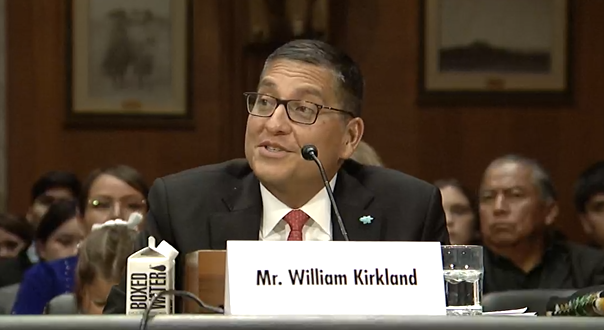
- Details
- By Levi Rickert
The U.S. Senate Committee on Indian Affairs held a confirmation hearing Thursday afternoon to consider the nomination of William “Billy” Kirkland (Navajo) as the 15th Assistant Secretary for Indian Affairs at the U.S. Department of the Interior.
The hearing came five months after being nominated to serve as Assistant Secretary for Indian Affairs by President Donald Trump on February 3, 2025.
Kirkland attended the hearing with his wife, Paige, and their three children—Will, Carter, and L—along with his parents and sister. Among those present in the audience was Navajo Nation Council Speaker Crystalyne Curley, the first woman to hold that position. Speaker Curley was joined by summer interns from the Navajo Nation Washington Office at the hearing.
Kirkland was reminded by the Senate Committee on Indian Affairs Chairperson Sen. Lisa Murkowski (R-AK) about the importance of the position of Assistant Secretary of Indian Affairs in her opening remarks.
“The Assistant Secretary for Indian Affairs is an important position at the Interior Department. Your job, if confirmed, will be to assist and support Secretary Burgum in fulfilling the United States’ trust responsibility to the federally recognized American Indian and Alaska Native tribes and individual Indian trust beneficiaries across the country. This trust responsibility is the cornerstone of federal Indian law and policy,” Chairperson Murkowski said.
In his opening remarks, Kirkland shared memories of his transient childhood, having moved 15 times due to his father's service in the U.S. Army. Despite the constant relocations, he fondly recalled spending time on the Navajo Nation, particularly helping haul water at his grandmother’s camp.
Though his early years were spent moving across the country, Kirkland has lived much of his adult life in Georgia, which has influenced his accent. He lightened the moment during the hearing by joking about being Navajo with a Southern drawl.
He presented the Committee with a two-and-half page opening statement.
“I understand that the mission of Indian Affairs at the Department of the Interior is to uphold meaningful government-to-government relationships with federally recognized tribes, Alaska Natives and ANCs; to enact policies that support self-determination and tribal sovereignty; and to steward trust assets while maintaining the federal trust responsibilities that aim to support the social, cultural, and economic self-sufficiency of tribal communities across Indian Country,” Kirkland said in his opening statement.
During his questioning, Sen. Brian Schatz (D-HI) referenced Kirkland’s lack of experience in Indian law, among other topics pertaining to Indian Country.
"If confirmed, I intend to spend my first 90 days listening to tribal leaders and the Congressional Committees of jurisdiction to understand top priorities and develop a clear action plan," Kirkland said.
Several senators on the Committee pressed Kirkland about the lack of adequate funding for Indian Affairs in President Trump’s proposed FY 2026 budget. They specifically raised concerns about the insufficient allocation for law enforcement on Indian reservations. Sen. Catherine Castro Masto (D-NV) informed him of a Bureau of Indian Affairs (BIA) study that shows there is a $3 billion shortfall in funding for public safety on Indian reservations.
At various points during the hearing, Kirkland admitted to being uninformed on certain topics related to Indian Country but assured senators that he looks forward to learning more about these matters once he is confirmed and sworn into the position.
The most tense exchange of the hearing occurred between Sen. Ben Ray Luján (D-NM) and Kirkland, when the senator questioned him about the Navajo Water Settlement. When Luján asked how many Navajo residents are in need of water, Kirkland responded, “Not offhand.” Luján replied, “250,000.”
The senator asked Kirkland if he knew how much money was allocated in the 2026 budget for the $175 million needed to fund the settlement. Kirkland replied, “I am sure you will tell me.” Sen. Lujan responded there were zero dollars in Trump’s budget to fund the water settlement.
Lujan pressed Kirkland: “Are you okay with this?”
Kirkland replied: “ I appreciate the question…I appreciate your enthusiasm.”
If the Senate Committee on Indian Affairs advances Kirkland’s nomination, it will go to the full Senate for confirmation.
The nominaton hearing video is available here.
More Stories Like This
Native News Weekly (August 25, 2024): D.C. BriefsUS Presidents in Their Own Words Concerning American Indians
Top Five Most-Read Stories in 2025 on Native News Online
Tribal Nations in SD are Betting on Tourism on Reservations
This Day in History — Dec. 29, 1890: Hundreds of Lakota Killed During the Wounded Knee Massacre
Help us defend tribal sovereignty.
At Native News Online, our mission is rooted in telling the stories that strengthen sovereignty and uplift Indigenous voices — not just at year’s end, but every single day.
Because of your generosity last year, we were able to keep our reporters on the ground in tribal communities, at national gatherings and in the halls of Congress — covering the issues that matter most to Indian Country: sovereignty, culture, education, health and economic opportunity.
That support sustained us through a tough year in 2025. Now, as we look to the year ahead, we need your help right now to ensure warrior journalism remains strong — reporting that defends tribal sovereignty, amplifies Native truth, and holds power accountable.
 The stakes couldn't be higher. Your support keeps Native voices heard, Native stories told and Native sovereignty defended.
The stakes couldn't be higher. Your support keeps Native voices heard, Native stories told and Native sovereignty defended.
Stand with Warrior Journalism today.
Levi Rickert (Potawatomi), Editor & Publisher


